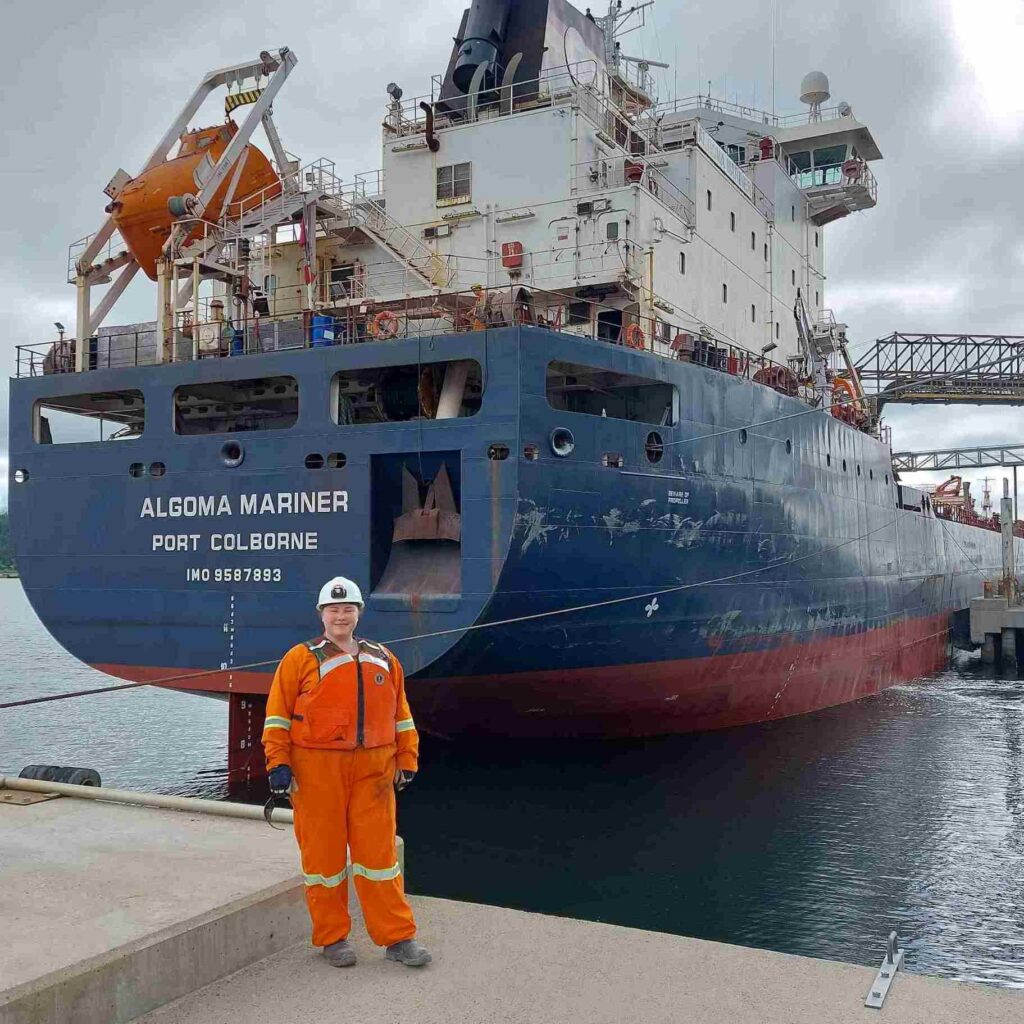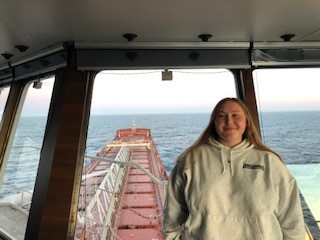A summer spent sailing – Brooke’s co-op experience
March 22, 2023
March is National Co-operative Education (co-op) and Work Integrated Learning (WIL) month. Georgian is a recognized leader in student work experience with most programs offering formal work-integrated opportunities.
Marine Technology – Navigation student, Brooke Herrington shares her co-op experience at Algoma Central Corporation, sailing onboard the M.V. Algoma Mariner as a Navigation/Deck Cadet for almost 70 days.
Was co-op an important part of your decision when you were choosing postsecondary education?
I learn best by applying my knowledge and skills in a hands-on environment, which is why choosing a program with co-op opportunities was extremely important. In a program like Marine Technology, time onboard a vessel is a huge component for cadets to feel confident in their career choice, skills and development. I felt co-op would allow me to fully experience the education and career I was interested in.
Why did you choose Georgian?
Georgian offers incredible programs for Navigation and Engineering Officers and have great relationships with the companies that support our education and offer co-op opportunities. The resources available like the simulators are incredibly immersive, a great learning component and an excellent opportunity to apply hands-on navigation skills such as chartwork, use of radar and ECDIS, without concerns of real-time navigation.
The Centre for Marine Training and Research will be a familiar place for many seafarers as they’re able to renew MED certifications or upgrade learning. Georgian is one of the few colleges to offer marine programs.
What drew you to the Marine Navigation program at Georgian?
Before deciding to pursue a career in the marine industry, I was confident I didn’t want the typical 9 to 5 office job. I wanted to find myself a profession where I’d find lifelong learning while incorporating hands-on skills and experience.
As a young woman coming into a male-dominated industry I believe I have positive, constructive change and influence to bring to the industry. There’ll be endless opportunities for growth, change, and development both professionally and personally. The Marine Navigation program drew me in because of the career options. I’m hoping to find employment after finishing my education and with the current expected retirement rates in the marine industry, there’ll be opportunities to fill those positions.
Why did you pursue Algoma Central Corporation to do your co-op?
I chose mindfully when considering companies I wanted to do my co-op with and hoped to work with a company I’d obtain full-time employment with post-graduation. I wanted to work for a company that supports and encourages their employees to be as knowledgeable and safe as possible in their roles while working. I know the company I work for wants me to succeed as a Watchkeeping Mate and I’ll continue to find support while my skills and career develop.
In the marine industry, there are many dangers working onboard or shoreside around ships, ports, and their facilities. It was incredibly important to me to work safely each day. When exploring co-op opportunities, I educated myself about the company’s commitment and dedication to safety. My life and the lives of my crewmates depend on the ability to look after themselves and others. I wanted to feel confident I’d be looked after while being taught how to keep myself and others safe; I have a family waiting for me to come home.
What exactly did you do at Algoma Central Corporation on the M.V. Algoma Mariner?
I was on the day shift on deck with Ordinary Seaman (OS) for the first six weeks. The jobs I encountered while on deck included: chipping and buffing rust before the application of primer and paint, unloading stores (groceries, laundry, packages and mail), preparing mooring wires, and assisting in preparation for pilot exchange. I also shadowed OS and the Third Officer when dropping anchor and had the opportunity to be hands-on while letting the anchor go or pulling it up. During cargo operations I’d assist the OS to move hatches by operating the hatch crane, spotting the track, and participating in general cleanup if bulk cargo ended up on the deck.
I then switched to 8 a.m. to noon on deck and 8 p.m. to midnight with the Third Officer. While underway, I had opportunities to wheel the vessel, learn how to fill out the deck log accurately, make radio calls and assist the officer. While shadowing the Third Officer during cargo operations I got to start and stop water ballast pumps, take dock water density and the ships drafts. I learned how to read cargo plans and follow them as cargo is loaded and discharged. I was fully introduced to the responsibilities that I’d have as a Third Officer. This was an incredible way for me to fully comprehend the role I’ll soon have.


What was your favourite part of the job? Do you have any memorable moments you’d like to share?
One of my favourite parts of the job was the evening watch while underway. Arriving at the bridge before 8 p.m. ensured I caught the sunset most nights.
My second favourite part of working onboard was the opportunity to develop myself personally. Having never left home before I was able to curate a new-found sense of freedom, courage and independence.
What role will this co-op play in the development of your career?
Reputation and experience are everything in this industry and co-op plays a vital role in cadet education and career development. During the time we sail, we learn new skills and gain experience we’re expected to demonstrate to our supervisors for our assigned tasks.
As soon as we join our first vessel we’re demonstrating our work ethic, and ability to manage responsibility, and are expected to keep ourselves and others safe while working. The onboard experience is vital to being a good seafarer as knowledge gained in school is applied and used in hands-on ways. By demonstrating my skills and competencies well, I’m more likely to be invited to sail with a company again and have another opportunity to prove my abilities will complement their crew and company. The companies we sail with offer co-op opportunities as a way to recruit future employees. It gives students and companies the opportunity to explore the best fit for both parties.
What advice do you have for students exploring their co-op options?
I’d advise co-op students to be open-minded to different ideas, roles and options. You may think there’s one way to achieve success, but by exploring different companies and roles within those companies, you realize there are different paths to achieve your goals.
Find co-op opportunities that will immerse you in the role and responsibilities that you can expect to encounter in your chosen profession.
Learn about the company’s history of offering co-op opportunities, mission statements and company reviews.
Define what you’re looking for in a co-op position. Are you looking for short-term employment? Long-term and future employment? Take time to think about how the opportunity will enhance your education and skill development. Lastly, if after you’ve completed your co-op and realize maybe that field isn’t the right fit, it’s okay to pursue something different.
Overall, the more effort you put into your co-op experience, the more you’ll get out of it.